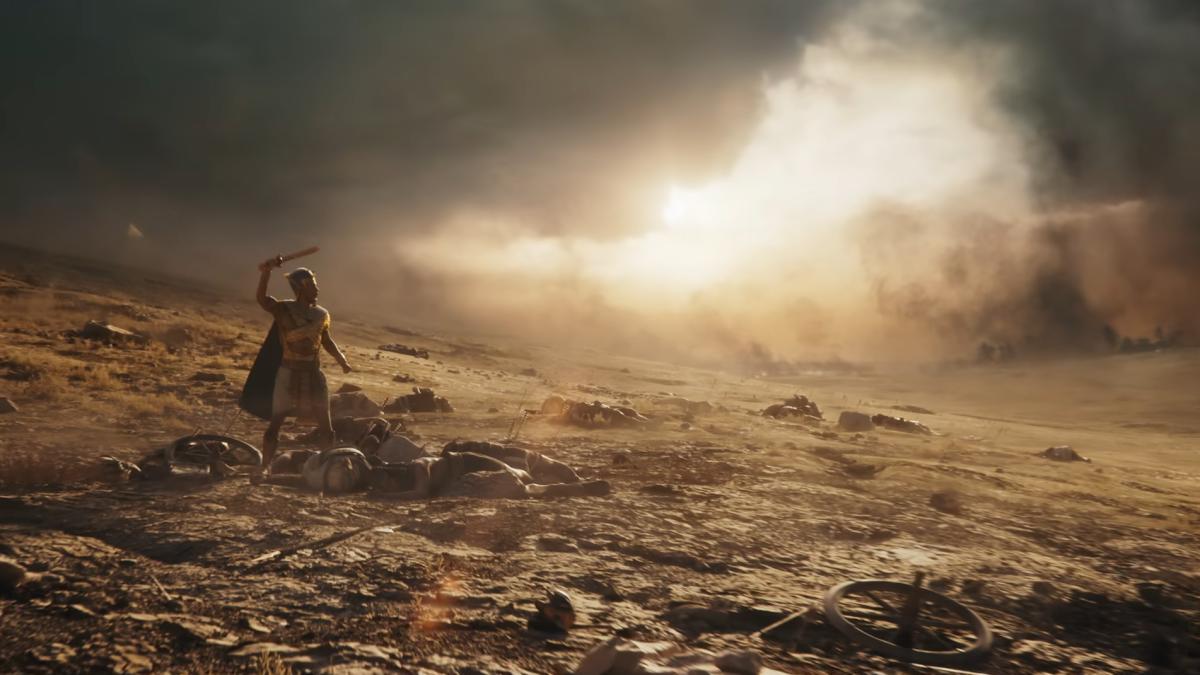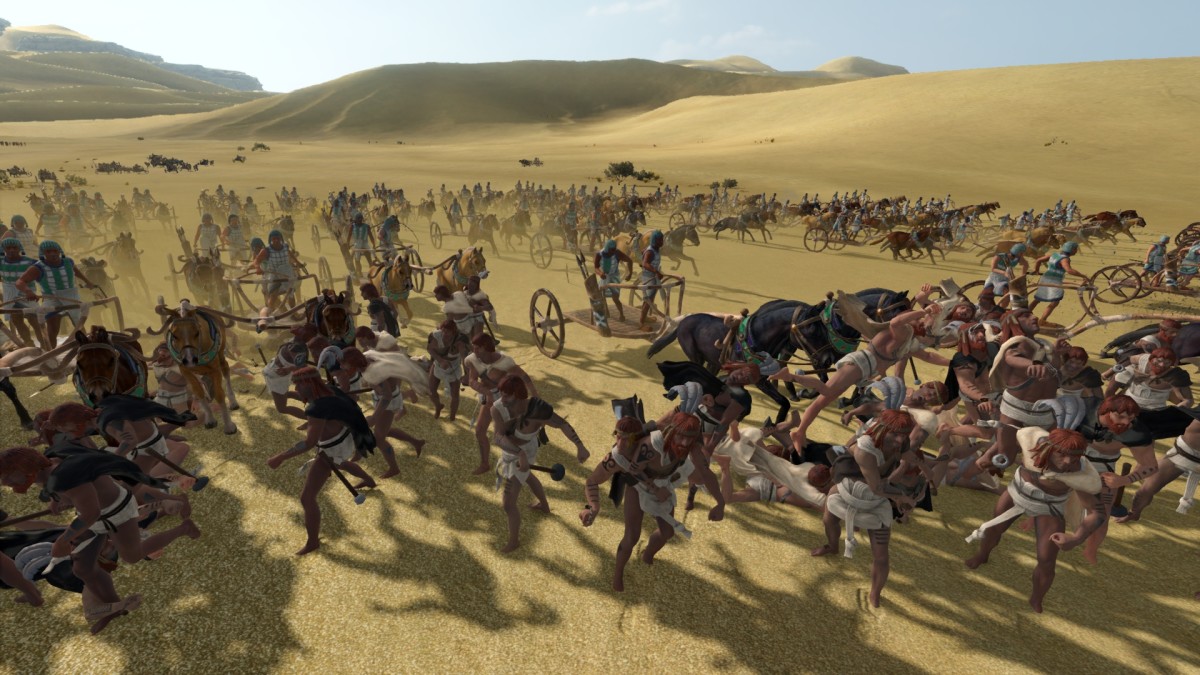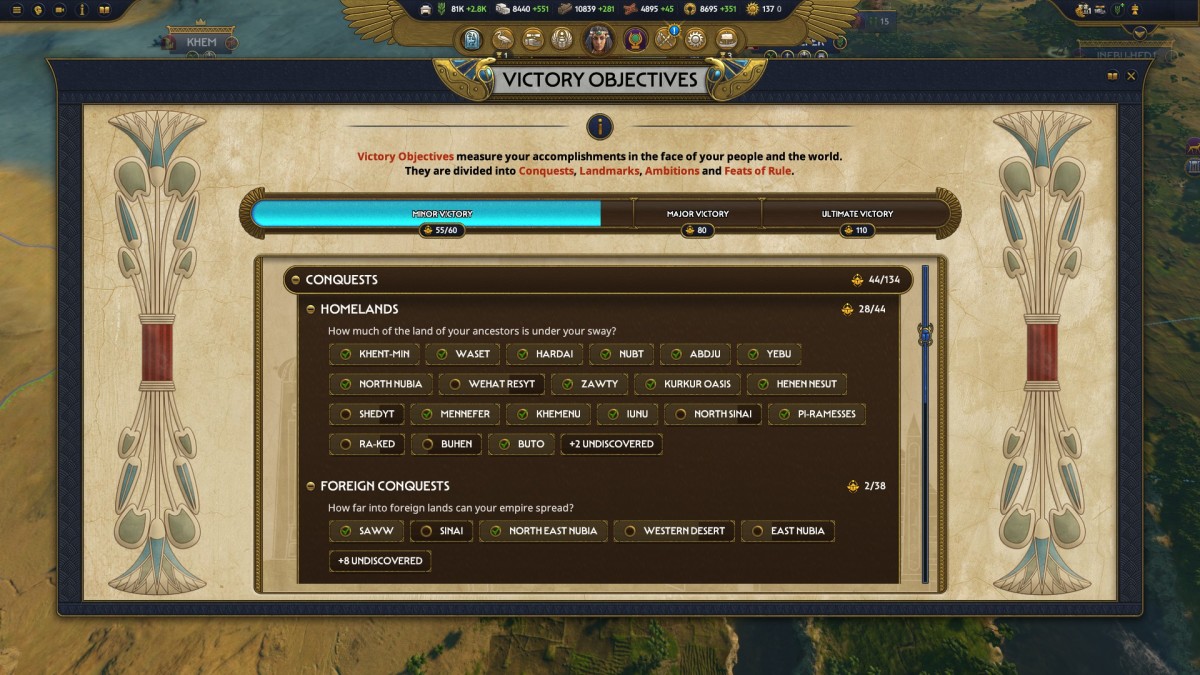Total War: Pharaoh tips for beginners

Contents
Civilization’s fate during the Bronze Age Collapse is now yours to determine thanks to Total War: Pharaoh. While adhering to most principles set by earlier titles in Creative Assembly’s beloved strategy game series, Creative Assembly Sofia’s Bronze Age iteration contains the most complex and in-depth campaign mechanics yet in Total War history.
Even if you’re a veteran player, you may need a moment or two to adapt to the amount of options the developers present you with – but don’t worry: We’ll get you to walk like an Egyptian with these Total War: Pharaoh tips for beginners in no time, teaching you how to use Outposts, how best to build up your military, and how to engage with the court system among other things.

How to use Outposts
Outposts are buildings you can construct outside of settlements in your provinces. You can build several of these in each province, though the maximum amount depends on the province’s size. It’s prudent to not only think about which Outposts you want to build in which province, but also to plan out where in the province you want each Outpost.
Outposts provide both a passive effect on their province as well as an active effect on any army that visits the building. For example, a Trading Post provides the entire province with a bonus on resource production as its passive bonus, whereas any army visiting the structure will for some turns reduce its upkeep cost. Outposts also restore a percentage of movement points to armies visiting them, essentially functioning as a highway to let armies get around your territory quickly.
I’d recommend building a Trading Outpost in every possible province for the economic benefits it provides. If you can, you should place these on the paths between your settlements, allowing any passing army to gain the reduced upkeep modifier. This will make your military cheaper, enabling you to build more troops.
Build Outposts like Monuments and Shrines in protected places, since you’ll mostly want to gain their passive benefits.
Waystations are recommended in desert areas, as they provide your armies with immunity to desert attrition. They are essential for maneuvering in dry regions and will allow you to attack from directions your enemy won’t see coming without losing half of your force to starvation.
Forts are an interesting option for settlements on the coast or on the western border of Egypt. These places will continually be under threat from the Libu Nomads and the Sea People, so if you build a Fort and place a few additional units in there, they can greatly help out in defending your territory.
How to maximize your provinces
You’ll want to keep an eye on two different values in your provinces: Happiness and Influence. If Happiness is low, you’ll eventually face an armed rebellion, while low Influence will reduce the amount of resources you gain from the province, straining your economy.
You can use Provincial Commandments, research Royal Decrees, construct certain buildings, or station armies in provinces to boost both of these important values. Maximizing these values will ensure that you won’t have to worry about rebels spawning in the area and will provide you with as many resources as possible – and both of these factors will help you strengthen your military in the places you need it most.
Make sure to build up each settlement to maximize the output of its specific resource and keep in mind that some of the large cities can construct special landmark buildings, which won’t only provide bonuses, but even generate Victory Points for you.
How to defend your empire
Due to the nature of Total War: Pharaoh, it’s a good idea to have one or two maxed out armies at most, which you can use to go on the offensive against other powers. A lot of the campaign is all about defending against incoming invaders and raiders. Each wave of Sea People throwing itself against civilization will have different characteristics, preferring to go after Outposts, settlements, or holy sites, giving you a clue on how to set up your defenses.
In general, I’d recommend you to station several smaller armies with a core of strong troops in threatened settlements, such as at the coast or the western border of Egypt. Fortify these towns with Forts, in which you station cheaper troops. They will automatically reinforce the settlement nearby in the event of an attack, which together with the town garrison and the general stationed there should be more than enough to defend against an assault. In cases of raiding, you can grab those additional forces from the Forts with your general, hunting down the attackers and then putting the units back into the Fort to benefit from the cheaper upkeep.
As for army compositions, it’s always wise to go for a balanced approach. Make sure you have a solid frontline to protect your ranged troops. There is no cavalry in Total War: Pharaoh, so you’ll need to mount flanking attacks with mobile infantry units or your chariots.

Speaking of chariots: The melee versions can be used as powerful flankers or to destroy exposed ranged units, while ranged versions should be used as mobile skirmishers that harass the enemy right from the start of a battle. Be careful about the terrain, though: Elements like woods, mud, and water will slow down and even damage your chariots, so pick your battlefield wisely. Bring one or two units wearing maces as well, if you’re facing enemies with heavily armored troops: In Total War: Pharaoh, troops can bash down on the enemy armor, reducing its effectiveness to allow lighter units to fight against them on equal footing. Mace-wielding infantry is particularly adept at this.
Keep an eye on the weather as well: Sandstorms are nasty for armies based around ranged troops, severely limiting their attack range and vision.
How to scheme
Life at court is as dangerous as on the frontline of a battle, so make sure to navigate the halls of power with care: Be sure to curry favor with persons of power by gossiping with them or helping them out with their own schemes. Once you’ve got enough favor with someone, you can either enlist them for your intrigues or gain benefits depending on their position. If you’re in need of a few elite units, it’s worth cultivating a good relationship with the head of the royal army or the Kushite viceroy. Need to arrange an assassination to free up a court position for yourself? Get friendly with the vizier and they may help you out with that.
Be sure to engage with the court system every turn to make the most of it and gain the position you think will help you most. It’s going to be a temporary job in most cases anyway, after all you’re aiming for the top position in the food chain – that of Pharaoh or Great King. Obtaining the necessary Legitimacy for that role is another mission court schemes can help you with.
Plots are always resolved on Shemsu Hor, which happens every sixth turn – plan your moves accordingly and make sure you’ve got enough turns for your plans to come to fruition.
How to mix things up
One of the new aspects of Total War: Pharaoh is the huge amount of customization options it offers. You can pretty much change any setting in the game to be closer to your tastes, be it staples like unit sizes or brand-new options like random start positions. If you feel like you need to tweak something to make the game more enjoyable for you or you want a completely different experience from the vanilla options, don’t be afraid to head into the settings and change things.
You can even customize a lot of options on the fly during a running campaign, though obviously settings like random start positions need to be enabled at the beginning of a game.
How to win the game
Total War: Pharaoh is, after all, still a Total War game, so you won’t be able to win without some bloodshed. However, diplomacy and a strong economy will get you a long way when it comes to achieving victory.

Victory Points in Total War: Pharaoh are awarded for holding provinces, but also for erecting landmark buildings, gaining political powers, and other achievements. While it’s totally viable to just paint the map in your color to win the game, there is a great amount of things you can do besides waging war to bring your triumph about.
For more on the game, check out our Total War: Pharaoh review.
